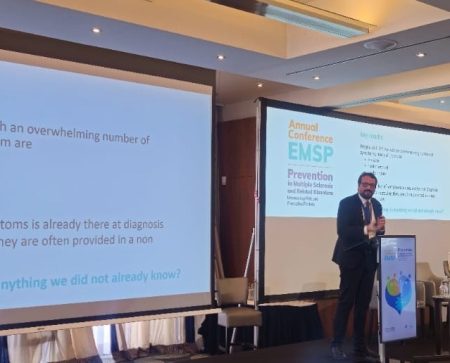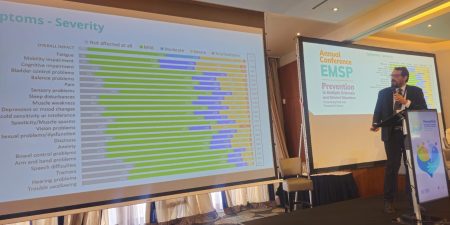
How Can We Use IMSS Data to Drive Systemic Change: Highlights from the IMSS Session at the EMSP Annual Conference 2025
22.05.2025At this year’s EMSP Annual Conference in Prague, one of the most anticipated sessions focused on the findings of the Impact of Multiple Sclerosis Symptoms (IMSS) survey — and more importantly, what we do with them next.
Tommaso Manacorda, researcher in health services and policy at AISM, and Patricia Moghames, Programme Coordinator at EMSP, led the session, which gathered MS societies, people living with MS, healthcare professionals, and partners from across Europe. Together, they explored not just the data – but the urgent need to turn findings into action.
Why the IMSS Survey Matters

The IMSS survey, coordinated by EMSP in collaboration with 24 national MS societies, collected data from over 17,000 people with MS across 22 countries. It sheds light on the most prevalent and severe symptoms and the current shortcomings in symptom management — particularly in the care of invisible symptoms like fatigue and cognitive impairment.
Despite the availability of treatment options, many respondents reported dissatisfaction with symptom care, pointing to a disconnect between what’s available and what’s truly accessible, coordinated, and effective in their daily lives.
Key Themes from the Session
Beyond presenting the background, methodology, and findings of the study, the session went deeper — opening the floor to attendees to reflect on their role in using the evidence. The guiding question of the interactive discussion was simple but powerful:
How can MS societies use this data to benefit people with MS?
Participants agreed: having robust data is more powerful than relying on anecdotal stories alone. It provides a solid, credible foundation for building a strong policy narrative – one that can demand changes in how care is designed, funded, and delivered.

Tommaso Manacorda presenting the IMSS findings at the Annual EMSP Conference 2025.
From data to policy change: What needs to happen next
The IMSS results make one thing clear: symptom management in MS is still under-prioritised in healthcare systems across Europe. This has real consequences for independence, wellbeing, and long-term quality of life.
The session put forward several recommendations and key messages for advocacy and policy influence:
- Symptoms matter. They are not just secondary issues — they contribute directly to functional loss and disability.
- Rehabilitation and symptomatic treatments exist, but they are not always accessible in ways that fit the daily lives and varied needs of people with MS.
- Coordination of care is essential. People with MS should not have to juggle disconnected services or navigate fragmented systems alone.
- We need policies that support integrated, person-centred care — ensuring that symptomatic care and rehabilitation are not seen as extras, but as essential components of MS management.
- People with MS must be empowered to recognise and report their symptoms. Under-reporting and under-treatment increase the risk of progression and reduce opportunities for early intervention.
Building a Policy Narrative
One of the most powerful takeaways from the session was the importance of crafting a policy narrative grounded in the IMSS data — one that can be adapted to national contexts and aligned with local health priorities. This narrative should include:
- Disease-modifying therapies are essential, but not sufficient.
- Symptom management is critical to maintaining function and quality of life.
- Services must not only exist — they must be accessible, affordable, and well-coordinated.
- The system, not the person, should bear the burden of coordination.
The Ball Is in Our Court
The message to MS societies and the wider MS community was clear: you are the changemakers. The data is here, and it’s robust. Now, it’s up to all of us — advocates, organisations, and partners — to use this evidence to shape conversations and influence the policies and systems that impact the daily lives of people with MS.
Interested in using the IMSS data?
National MS societies and partners can access and use the IMSS data to support their advocacy efforts by following a formal request process. EMSP is committed to sharing data transparently and ethically, in line with intellectual property agreements and data protection protocols. Requests for national datasets or specific analyses can be submitted to EMSP and will be reviewed in accordance with the IMSS data governance framework.
This is only the beginning. Let’s ensure the IMSS data does not sit on a shelf, but becomes a catalyst for real, measurable, and lasting change across Europe.
Want to use the IMSS data in your own advocacy?
EMSP will soon release a series of resources, including national country sheets and communication toolkit for MS societies.
Please check the IMSS project and findings.
https://emsp.org/projects/impact-of-multiple-sclerosis-symptoms-imss/
 Your Account
Your Account


